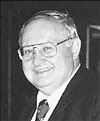In 1990, Manuel Ayau (1925-2010), the founder and late president of the Universidad Francisco Marroquín in Guatemala, asked Leonard and I to help him build the program of a regional [Mont Pelerin Society] meeting. Although the topic always led to major disagreements among classical liberals, we organized a panel on religion and liberty. We invited Father Robert Sirico to speak. That meeting led to conversations among us and eventually to the founding of the Acton Institute for the Study of Religion and Liberty. The co-founders, Sirico and Kris Mauren asked us to become founding trustees.
Chafuen pointed to Liggio’s deep faith:
Liggio was much more than a man of ideas, he was also a man of the spirit. Whenever he saw a friend or colleague with some pain in their soul, he shared with them, with respect, love and above all, understanding, the treasure that he found in his Catholic faith. He always reminded think tank leaders to avoid scheduling events during the religious holidays of other faiths. Leonard Liggio was a scholar, intellectual entrepreneur, and generous human being who serves as an example of how to devote a life to promote the free society.
Among Liggio’s writings were a number of articles for Acton publications. For Religion & Liberty he wrote, “The Heritage of the Spanish Scholastics” (2000); “Freedom and Virtue” (1998); and “Christianity, Classical Liberalism are Liberty’s Foundations” (1996).
His book reviews for the Journal of Markets & Morality are accessible here, here and here.
The Atlas Network, where Chafuen is president, also offered a detailed account of Liggio’s life and work and observed that he “called for younger scholars to make an expansive case for liberty (along the lines of Hayek’s Constitution of Liberty or Friedman’s Capitalism and Freedom) – instead of focusing on ever-narrower subjects to cater to the interests of academic journals (at the cost of failing to excite the public imagination).”
At Reason.com’s Hit & Run blog, Brian Doherty described Liggio as “a great libertarian scholar and institutional activist” and described how he “played some role in nearly every institution pushing libertarian ideas from 1950 to now.” Doherty provides a number of links to Liggio’s works and concludes:
Liggio was a pioneer, and while many may not remember his name, what he did to cement and spread libertarianism will echo in American and world history for a very long time to come. Liggio had, as one admiring student of his once told me, a vast thousand-year vision of the slow spread of liberalism across the globe, one that allowed him to contemplate both past and present with equanamity, neither despairing for liberty’s future nor being unrealistically enthusiastic about its imminent victory.
